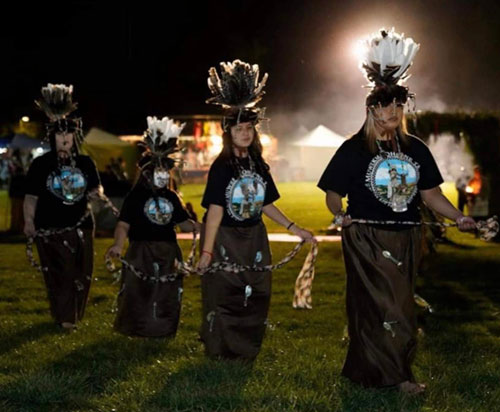Federal Recognition – For the Muwekma, a Previously Federally Recognized Tribe: It Is a Birthright Denied
Federal Recognition – For the Muwekma, a Previously Federally Recognized Tribe: It Is a Birthright Denied November 2024
The Muwekma Ohlone Tribe is native to the San Francisco Bay Area and has been here for thousands of years. How long is uncertain because their origin dates back to before the dawn of recorded history, and before there was a San Francisco Bay. With the arrival of the European settlers, and their occupation of what is now California, the tribe, along with the rest of the large Native American population suffered injustice, deprivation, and loss that reduced its numbers from an estimated 30,000 in the past to over 600 tribal members today. Although not one of the larger well-known tribes, the Muwekma has suffered as much as the other tribes at the hands of both the state and federal governments while continuing to play roles in the growth and development of the nation, including having many members who have served with distinction in the military, spanning from World War I through today. But they have not regained their previous federally recognized status under 25 Code of Federal Regulations (CFR) Part 83.8 which the Bureau of Indian Affairs and federal courts acknowledged since making a formal determination on May 24, 1996, that they rightfully deserve.
What Is Federal Recognition?

There are estimated to be over 1,000 Native American tribes now left in the U.S. Of these, 574 have are federally recognized, while the rest have been ignored and denied by politicians and bureaucrats. Federal recognition of trbes is acknowledged by the US Government under various historic circumstances including the 389 nation to nation treaties negotiated between the US and Native American tribes. Of these 389 treaties only 371 were ratified by the uS Senate and signed by the president of the US. The 18 unratified California Indian treaties of 1851-1852 were sealed under the secret archives of the US Seante until their rediscovery in 1905 by a senate clerk and Charles E. Kelsey from San Jose who was later named Special Indian Agent to Northern California (Los Angeles to the Oregon Border). In his capcity as Special Indian Agent for the Indian Service Bureau, Kelsey recognized two of the Muwekma rancherias located at Pleasanton and Niles in his Special Indian Census which he would name the tribal communities as the Verona Band of Alameda County. Thus began the federally recognized status of the Muwekma who then became eligible for land purchase under Congressional Appropriation Acts the 1906, 1908, and later years for Landless and Homeless California Indians.
The Department of the Interior’s Bureau of Indian Affairs defines a federally recognized tribe as “an American Indian or Alaska Native tribal entity that is recognized as having a government-to-government relationship with the United States, with the responsibilities, powers, limitations, and obligations attached to that designation and is eligible for funding and services from the Bureau of Indian Affairs. Furthermore, federally recognized tribes are recognized as possessing certain inherent rights of self-government (i.e., tribal sovereignty) and are entitled to receive certain federal benefits, services, and protections because of their special relationship with the United States.”
A Rightful Status Denied
The Muwekma Ohlone were previously recognized as a tribe but in 1927 the tribe was removed from the Federal Register in 1927 by Sacramento Superintendent Lafeyete A. Dorrington along with 134 other Callifornia Indian tribes. Even without land the Muwekma were disenfranchised and marginalized and struggled economically, However, they want their federal recognized status restored which would provide them the equal treatment and benefits that is accorded recognized tribes.
The struggle for recognition has been stuck in the swamp of bureaucratic red tape and political obstruction. Under the 1928 California Jurisdictional Act the Muwekma families enrolled with the Bureau of Indian Affairs between 1928-32, 1948-57, and 1968-71 which meant that it was implicitly recognized by the Bureau of Indian Affairs. But the BIA decided in 2002 that the Muwekma could not have its tribal status restored. Repeated attempts to prove this wrongful decision have failed because of arbitrary decisions by the Office of Federal Recognition staff to claim that the Tribe could not use their BIA enrollments or the fact that some of the children were shipped off to Indian Boarding schools during the 1930s and 1940s, and rejecting other histoic documents and evidence which they did not weigh in their decision making. The Department of Interor lawyers also deceived the federal courts by stating that the Tribe had only one piece of evidence etween 1927 and 1985.
The Fight Continues
From the California Legislature to Washington D.C., the Muwekma’s struggle for recognition continues on. The tribe recently undertook a horseback journey from San Francisco to the nation’s capital to draw attention to its demand for its federaly recognized status to be retored. Progress continues to be slow, but the Muwekma have been here for thousands of years ,and they will not allow a century or two of injustice and more recent setbacks to stop them.
The struggle of the Muwekma Ohlone to regain its federal recognition is an inspiring one. To learn more about it and how it can be supported, visit the tribe’s Website.